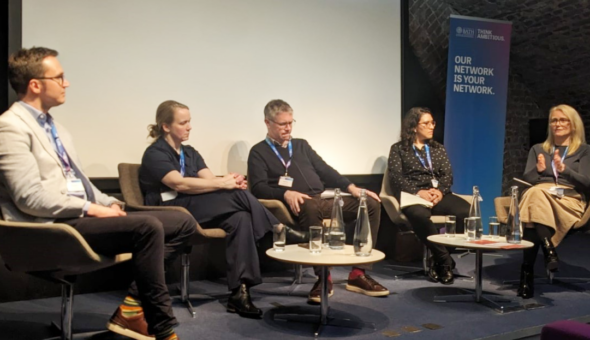Throughout October, we’ll be hosting a Crossing Boundaries takeover, exploring issues around modern slavery to mark Anti-Slavery Day on the 18th.
Dr Mike Rogerson completed his PhD in Business, Organisations & Society at the School of Management in March 2023 and is now a Lecturer in Operations Management at the University of Sussex. He co-chaired Crossing Boundaries: The 2023 Business and Modern Slavery Research conference and here shares his experiences of postgraduate study at Bath and how it helped him build a lasting network.
What drove you to choose Bath for your PhD?
It was Professor Andy Crane. We recently got together 80-plus people from around the world to talk about modern slavery research at Crossing Boundaries, but when I began the PhD there were maybe four or five people who had published on modern slavery in business. I'd done a postgraduate certificate in sustainable value chains at Cambridge immediately before and had been looking at the literature for two or three years: when I first started looking at the business literature, Andy was essentially the only name in town.
I was pretty intent on doing a PhD on modern slavery, so I went to meet him. I'd met Professor Laura Spence, who was then at Royal Holloway and is now at Oxford, several years before and got on really well with her, and so I asked her if she thought Andy would be open to it. I went to see him and I thought it was going to be this big, formal interview, but it was just a coffee and at the end he said, “So, are we doing this or not?”
What was your research topic and how did you decide on it?
I’d been working in Africa and the Middle East for six or seven years before I came back to the UK, and so I wanted to do a piece of research on modern slavery and how firms from various countries were addressing the risks: what they were disclosing, how they were disclosing it and what the differences were between Qatar, Russia and the UK.
Once I started, it changed almost immediately. I did a pilot project as part of the one-year master's at the beginning of the PhD on how universities were responding to modern slavery legislation and we found some really interesting things. The rest of the PhD turned into a look at UK public sector responses to the Modern Slavery Act.
What initially sparked your interest in the topic?
I've always been interested in responsible business. I worked in Qatar in 2012 and 2013, and the World Cup projects were ramping up at that point; the entire city of Doha was a building site. I was working for a construction firm, and we could look out of our window and see people working in 52-degree heat with no protective equipment, no obvious source of water around them. It became something that I worked on from an operational strategy perspective with the company.
I came back to the UK when the company that I had been working for was embroiled in a corruption scandal and I didn't really know what to do, so I did an MBA and then the postgrad certificate at Cambridge, which focused entirely on modern slavery in supply chains.
I was an operations consultant at the time and I found myself going back to hotels all over the world at the end of the working day – rather than working on what I should be doing for the next day, I found myself doing desk research on modern slavery and how the literature was developing. At some point I thought to myself, ‘I really like this. Why am I not doing this full time?’
What were the findings from your PhD research?
The big headline was that despite the public sector having this enormous influence or potential influence over its suppliers through the volume and the value of what it buys, no one I spoke to really knew what to do with that. They were all thinking individually as opposed to collectively. The action needed to really move the dial and make a big difference in supply chains hadn't materialised because they didn't really understand – and still don't, to a large extent – how to bring that potential to bear on suppliers.
As part of that, we found that the mechanism underpinning the Modern Slavery Act – which is that organisations do their own thing and then everyone reports annually, and then there is this feedback loop where best practice becomes more and more widely adopted and sharpened – wasn't happening. The public sector, both because of its public mission and the lack of legislation on topics such as collusion, is very collaborative. Everyone talks to everyone else before they do anything, and so everyone was taking exactly the same approach in response to the Modern Slavery Act and had therefore effectively short-circuited the mechanism through which the law was supposed to work.
What are the wider implications of this?
The first thing is that we need a law that's fit for purpose. We need a law that isn't predominantly about disclosing action: we need a law that that mandates action. A much stronger law would be a great start.
The way that the public sector buys needs to change, too. The public sector buys through framework agreements negotiated by third parties, which for the past 50-60 years have negotiated prices for goods and are increasingly stipulating sustainability conditions. The law makes it quite difficult to really favour organisations that do a lot of good work around any sustainability issue and makes it really difficult to disqualify bad actors: everything that goes into public procurement tenders is done on an almost ‘mark your own homework’ basis.
Big firms with sophisticated tendering divisions have become very good at winning tenders and getting themselves onto frameworks. Small companies – that often do a lot better on some of these really important issues – have to work extremely hard just to keep up with firms that have the scale and resources to game the system.
What advice would you offer to others studying or considering a PhD?
I don't like the word networking, but it's all about networking! I got my first job after the PhD from the network I'd built; I've been invited to present at conferences that I wouldn't otherwise have been invited to; I've been given advice by people who've been doing this for a long time. It's been completely priceless. It's very hard to get your name known when you're a PhD student, but I had a small but good network way before I published my first paper – because I was just prepared to go and meet people.
Beyond networking, the biggest piece of advice I'd give any PhD is that your supervisor is not your boss. You're not working in the supermarket. They're called the supervisor, but in bits of North America they call them a doctoral advisor – and that's what they should be. You need to listen to your supervisor a lot, but your PhD is yours and you need to get what you want out of it, which will involve holding your ground sometimes.
Respond



